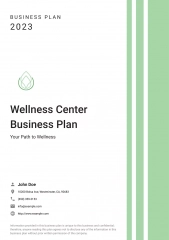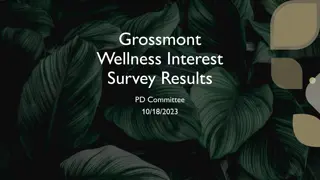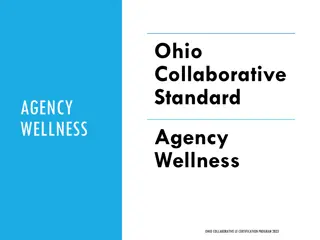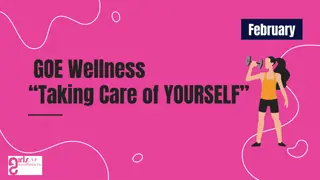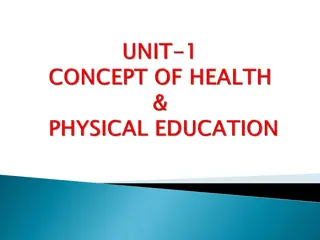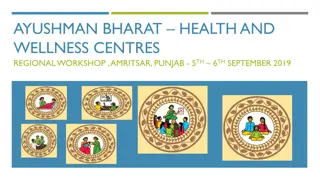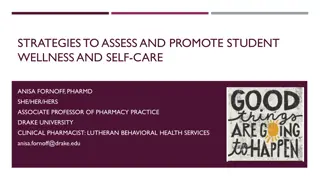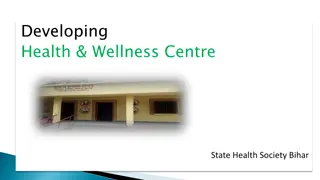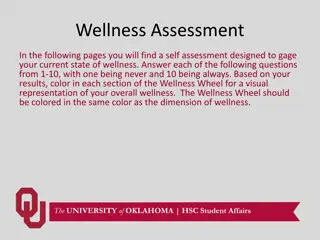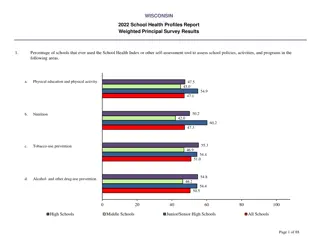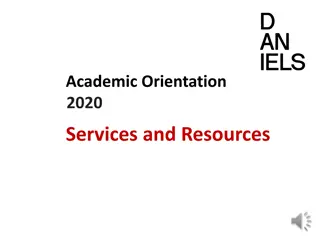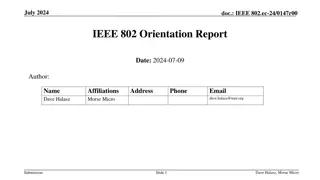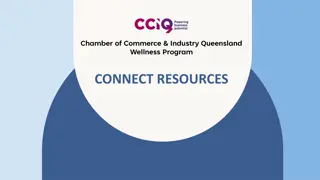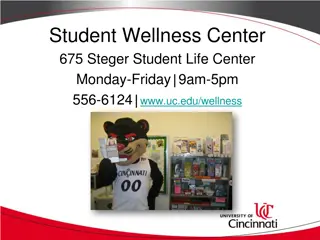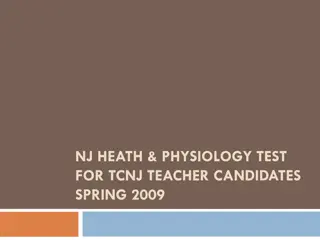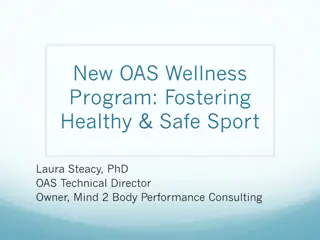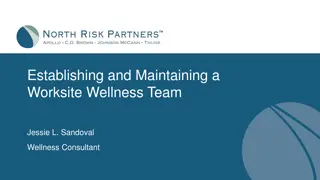Health and Wellness Center Orientation Overview
This presentation covers various aspects of student orientation at the Health and Wellness Center, including student services, policy requirements, introduction to health services, required procedures, information on HIV and other STIs, privacy and HIPAA guidelines, and medical services offered. Students are briefed on what to expect during health evaluations, services available, specialty programs, and the importance of maintaining good health and privacy protocols.
Download Presentation

Please find below an Image/Link to download the presentation.
The content on the website is provided AS IS for your information and personal use only. It may not be sold, licensed, or shared on other websites without obtaining consent from the author.If you encounter any issues during the download, it is possible that the publisher has removed the file from their server.
You are allowed to download the files provided on this website for personal or commercial use, subject to the condition that they are used lawfully. All files are the property of their respective owners.
The content on the website is provided AS IS for your information and personal use only. It may not be sold, licensed, or shared on other websites without obtaining consent from the author.
E N D
Presentation Transcript
HWM ORIENTATION PART 1: STUDENT SERVICES
THE POLICY AND REQUIREMENTS HANDBOOK PRH Chapter 2, sections 2.3 R1-R4 Refer to PRH for policy Policy in this presentation has been paraphrased
THE PRH THE PRH P POLICY AND R REQUIREMENTS H HANDBOOK Refer to the PRH for policy questions and guidance PRH Chapter 2, sections 2.3 R1- R19 Policy in this presentation has been paraphrased 3
STUDENT ORIENTATION PRH 2.3 R1
STUDENT INTRODUCTION TO HEALTH SERVICES All students must receive an orientation presentation to explain what will happen during the cursory health evaluation and physical examination, and the services offered at the health and wellness center 5
STUDENT ORIENTATION- WHAT IS REQUIRED Explanation of procedures/tests that are performed as part of the medical and oral exam Employability and good health 6
OTHER AREAS INCLUDED IN ORIENTATION Information on HIV and other STIs Family Planning TEAP mental health oral health services Information on specialty programs and services (TUPP, disability/accommodations, open hours, after hours and weekend care. 7
PRIVACY AND HIPAA EXPLAINED IN ORIENTATION The HIPAA Notice must be signed on the first visit to the health and wellness center; the SHR should contain a complete HIPAA Authorization and a complete HIPAA Notice Protection of personally identifiable information (PII) Program Instruction Notice NO. 06- 23 8
MEDICAL SERVICES PRH 2.3, R2
BASIC MEDICAL SERVICES Centers must provide basic medical services to students. (NOTE:For a description of basic services, refer to Exhibit 2-4 Job Corps Basic Health Care Responsibilities.)
CURSORY EXAM A cursory health evaluation, laboratory testing, and a medical history within 48 hours of arrival on center. The medical history must be documented on the Job Corps Health History Form. The cursory health evaluation and medical history must be conducted by a qualified health professional designated by the Center Physician.
ENTRANCE LABORATORY COMPLETED FIRST 48 HOURS HIV (see 2.3, R15 regarding waiver) Sickle Cell offered to all at risk students Hemoglobin or Hematocrit Syphilis Serology (optional) Urinalysis (dipstick for glucose and protein) Urine Drug Screen (UDS) Chlamydia and Gonorrhea* Pregnancy for females
IMMUNIZATIONS All applicants are required to provide Admissions Counselors with current immunization records at the time of application. Immunizations or boosters if the following immunization series are incomplete or if current immunization records cannot be produced: Tetanus and diphtheria toxoid (Td) or Tetanus-diphtheria-acellular pertussis (Tdap) Inactivated polio vaccine (IPV) for students younger than 18 years Measles, mumps, and rubella vaccine Hepatitis B vaccine series At a minimum, Hepatitis B vaccine must be provided to health personnel and health occupations training students. Vaccination of health occupations training students must begin six weeks prior to on-site clinical work experience. Centers should utilize the Vaccines for Children program to provide immunizations for eligible students according to the latest Centers for Disease Control and Prevention (CDC) guidelines.
TUBERCULIN SKIN TEST (TST) A tuberculosis skin test (Mantoux) is required of all new students who do not have documented proof of a previous negative Mantoux test taken within the last 12 months. Annual tuberculin testing should be done for students in health occupations and for students at increased risk of infection. In addition, students in health occupations must receive a Mantoux test prior to clinical work experience in accordance with state or local health department requirements. Results of tuberculin skin testing should be interpreted without regard to a prior history of BCG vaccination. Refer to Treatment Guidelines in the Health-Care Guidelines TAG, for management of students with a positive Mantoux test.
SCENARIO 1 You meet the new students in wellness for orientation and to explain about wellness and what will occur today. You mention the student will have some laboratory tests including HIV and urine drug screens. Have their vital signs including (height, weight, waist circumference, BP, pulse). Sara, an 18-year-old, asks to speak to you privately. Sara tells you she is HIV positive. She did not indicate this on her ETA 6-53 and you do not have any records. Do you still draw blood for a HIV test?
REQUIRED DOCUMENTS Have student complete Job Corps Health History Form and meet with the student to go over any alert questions noted with an *asterisk. Go over and have student sign HIPAA Notice Review Open Call hours and explain after hours and weekend care and how to access wellness and make appointments. Explain the services offered on center (TEAP, CMHC, center physician) Obtain immunization records if not supplied by the OAs and document and immunizations given on the Job Corps Immunization Record Document pre- and post-HIV counseling and have student sign Form 2-02 HIV Testing Information Sheet
VISION AND HEARING SCREENING Conduct vision screening (near, distance and color vision) For students with 20/40 refractory deficiencies refer to optometrist and ophthalmologist When indicated, the center must furnish one pair of glasses that meet American National Standards Institute (ANSI) standards. Using audiometer conduct a hearing screening testing at the follow Hertz levels (Hz) 500, 1000, 1500, 2000, 3000, 4000, 6000 Document results on the Job Corps Physical Examination Form
PHYSICAL EXAMINATION A complete entrance physical examination and a review of the medical history within 14 days. (The physical examination must be provided by a qualified health professional and documented on the Job Corps Physical Examination Form. (NOTE:As determined by the center physician who authorizes the activity by a written personal authorization.) Schedule students for Physical Examination with the center physician or their designee. Exam should include: breast exam for females testicular exam for male students discuss birth control and safe sex Female students 21 and older should receive a Pap Smear if they have not had one in the last 24 months.
CHRONIC CARE MANAGEMENT Students identified as having chronic health problems during the cursory or entrance physical must be monitored as directed by the Center Physician or other appropriate center health- care provider. Evidence of Chronic Care Management should be documented in the SHR. This can be using the CCMPs located on the Health and Wellness website https://supportservices.jobcorps.gov/health/Pages/HCGuidelines.aspx#ccmps or making a note clearly titled as Care Management or Case Management Note.
SCENARIO 2 New student Mark refuses to have a physical exam. How should you handle this situation? A. Tell Mark he does not have a choice the physical is mandatory B. Explain to Mark he has to at least meet with the medical provider C. Explain about the requirement of a physical exam to play sports and he may require a physical for outside or hard trades D. Explain to Mark he can have the physical done by his physician at his home at his expense and this should be done in the next 14 days. E. Tell Mark he can have a chaperone of his choice present in the room during the exam F. All are correct except A
OTHER SERVICES PROVIDED A daily walk-in clinic outside of the training hours for students to receive routine health care. An inpatient unit (during office hours) for minor conditions, such as respiratory infections or flu symptoms. An appointment system for follow-up during the training day for treatment of chronic, urgent, and other conditions within the capabilities of center health professionals. Treatment Guidelines for Health Staff shall be used to manage common acute and chronic conditions.
OTHER REQUIREMENTS Students should have access to Rx medications either Using their insurance Centers obtaining low cost Rx from local pharmacies offering $4 or $10 Using PPARx.org or Needymeds.org Contacting the pharmaceutical company for coupons or discounts An off-center specialist referral system. A 24-hour emergency-care system, to include on-center CPR and first aid and written referral plan or agreement for off-center medical, oral health, mental health, substance use, and inpatient care.
ORAL HEALTH SERVICES PRH2.3 R3
BASIC DENTAL SERVICES The general emphasis of the Oral Health and Wellness Program must be on early detection, diagnosis of oral health problems, basic oral-health care, dental hygiene, and prevention/education (e.g., oral hygiene instructions, caries risk assessments, the relationship between oral health and employability, oral health and wellness plans).
DENTAL READINESS INSPECTION Dental Readiness Inspection: completed within 14 days after arrival by the center dentist or designee who should authorize the activity by a written personal authorization. Document the inspection in the appropriate section of the Job Corps Physical Examination Form. Health and Wellness personnel conducting the DRI will utilize the Dental Readiness Inspection Checklist and look specifically for holes in the students' teeth, swelling in mouth or jaw, sores, bleeding, and other obvious serious oral health issues. Non-dentists do not diagnose the conditions; they merely detect signs and symptoms.
ELECTIVE ORAL EXAMINATION An elective oral examination Elective Oral Examination: including bitewing x-rays, priority classification, and treatment plan, completed and recorded on the Job Corps approved oral examination form by the center dentist upon student request as a follow up to the dental readiness inspection. The x-ray images should be securely stored as part of the student s health record. After the dental readiness inspection, all dental services are voluntary. 26
DENTAL PROCEDURES Dental Procedures: to treat oral disease and correct oral health conditions that may represent employability barriers, to include: restorations, extraction of pathological teeth root canal therapy on anterior/other strategic teeth replacement of missing upper anterior teeth with a removable prosthesis dental hygiene treatment for periodontal disease Referral agreement with community facilities for emergent or urgent conditions treatable beyond the expertise of a general dentist.
ORAL HEALTH AND WELLNESS Orthodontics Not paid for by Job Corps Applicants with orthodontic appliances must have a signed agreement in place before arrival 1. Proof of orthodontic care visits during previous 3 months consistent with orthodontic treatment plan. 2. Proof that a treatment plan is in place for continued care. 28
DENTAL QUESTION 1 Who can conduct the DRI? a. Only Dentist or Dental Hygienist b. Only the Dental Assistant c. Nurses, Dental Assistant, Dental Hygienist as long as they have been trained and checked off by the dentist and has a personal authorization signed by the dentist.
DENTAL QUESTION 2 What if the Dentist is not on center and refuses to train the nurses to conduct the DRI? a. Send all students to the off center dentist office for elective dental exams b. Omit the DRI and only send students to the dentist who have complaints or want to see the dentist c. Request the center physician authorize the nurses to conduct the DRI
MENTAL HEALTH PRH 2.3 R4
MENTAL HEALTH AND WELLNESS PROGRAM The general emphasis of the MHWP is on: Early identification and diagnosis of mental health problems Basic mental health care Mental health promotion and education designed to help students overcome barriers to employability Helping students learn strategies to finish program and become employed 32
MENTAL HEALTH PROGRAM Five main components: Assessment Mental Health Promotion and Education Consultation and Training Disability Program Support (including applicant file reviews) Treatment 33
MENTAL HEALTH PROGRAM Assessments and recommendations for Job Corps applicants Review of Social Intake Form (SIF) MSWR or medical separation for mental health issues Presentation on mental health promotion and employability to students during the Career Preparation Period (CPP) A written referral/feedback system Steps/procedures for mental health emergencies Regular case conferences for information exchange 34
MENTAL HEALTH QUESTION 1 Who should review the applicant folders for an applicant with mental health diagnosis/condition? a. TEAP Specialist b. CMHC c. HWM
MENTAL HEALTH QUESTION 2 If there is a recommendation of denial with a mental health condition who should sign the DTA or HCNA? a. TEAP Specialist b. CMHC c. HWM
MENTAL HEALTH QUESTION 3 How long after entry should the CMHC review and sign off on the SIF? a. Seven days b. Fourteen days c. Thirty days d. No time frame
RESOURCES PRH Chapter 2, 2.3 PRH Exhibits 2-4 Basic Care PRH Forms 2-01 HIPAA Notice 2-02 HIV Information Sheet Health and Wellness Manager Desk Reference Guide (DRG) Oral Health DRG Mental Health DRG

 undefined
undefined





